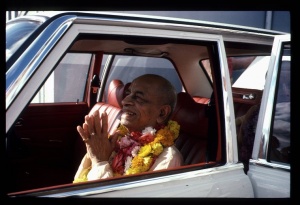CC Madhya 22.7 (1975): Difference between revisions
(Vanibot #0027: CCMirror - Mirror CC's 1996 edition to form a basis for 1975) |
(Vanibot #0020: VersionCompareLinker - added a link to the Version Compare feature) |
||
| Line 2: | Line 2: | ||
<div style="float:left">'''[[Sri Caitanya-caritamrta (1975)|Śrī Caitanya-caritāmṛta (1975)]] - [[CC Madhya (1975)|Madhya-līlā]] - [[CC Madhya 22 (1975)|Chapter 22: The Process of Devotional Service]]'''</div> | <div style="float:left">'''[[Sri Caitanya-caritamrta (1975)|Śrī Caitanya-caritāmṛta (1975)]] - [[CC Madhya (1975)|Madhya-līlā]] - [[CC Madhya 22 (1975)|Chapter 22: The Process of Devotional Service]]'''</div> | ||
<div style="float:right">[[File:Go-previous.png|link=CC Madhya 22.6 (1975)|Madhya-līlā 22.6]] '''[[CC Madhya 22.6 (1975)|Madhya-līlā 22.6]] - [[CC Madhya 22.8 (1975)|Madhya-līlā 22.8]]''' [[File:Go-next.png|link=CC Madhya 22.8 (1975)|Madhya-līlā 22.8]]</div> | <div style="float:right">[[File:Go-previous.png|link=CC Madhya 22.6 (1975)|Madhya-līlā 22.6]] '''[[CC Madhya 22.6 (1975)|Madhya-līlā 22.6]] - [[CC Madhya 22.8 (1975)|Madhya-līlā 22.8]]''' [[File:Go-next.png|link=CC Madhya 22.8 (1975)|Madhya-līlā 22.8]]</div> | ||
{{CompareVersions|CC|Madhya 22.7|CC 1975|CC 1996}} | |||
{{RandomImage}} | {{RandomImage}} | ||
==== TEXT 7 ==== | ==== TEXT 7 ==== | ||
<div class="verse"> | <div class="verse"> | ||
:advaya-jñāna-tattva | :advaya-jñāna-tattva kṛṣṇa--svayaṁ bhagavān | ||
: | :'svarūpa-śakti' rūpe tāṅra haya avasthāna | ||
</div> | </div> | ||
| Line 25: | Line 24: | ||
<div class="translation"> | <div class="translation"> | ||
advaya-jñāna—of nondual knowledge; tattva—the principle; kṛṣṇa—Lord Kṛṣṇa; svayam bhagavān—Himself the Supreme Personality of Godhead; svarūpa—personal expansions; śakti—of potencies; rūpe—in the form; tāṅra—His; haya—there is; avasthāna—existence. | |||
</div> | </div> | ||
| Line 32: | Line 31: | ||
<div class="purport"> | <div class="purport"> | ||
The Lord has many potencies, and He is nondifferent from all these potencies. Because the potencies and the potent cannot be separated, they are identical. Kṛṣṇa is described as the source of all potencies, and He is also identified with the external potency, the material energy. Kṛṣṇa also has internal potencies, or spiritual potencies, which are always engaged in His personal service. His internal potency is different from His external potency. | The Lord has many potencies, and He is nondifferent from all these potencies. Because the potencies and the potent cannot be separated, they are identical. Kṛṣṇa is described as the source of all potencies, and He is also identified with the external potency, the material energy. Kṛṣṇa also has internal potencies, or spiritual potencies, which are always engaged in His personal service. His internal potency is different from His external potency. Kṛṣṇa's internal potency and Kṛṣṇa Himself, who is the potent, are always identical. | ||
</div> | </div> | ||
Latest revision as of 14:35, 27 January 2020

A.C. Bhaktivedanta Swami Prabhupada
TEXT 7
- advaya-jñāna-tattva kṛṣṇa--svayaṁ bhagavān
- 'svarūpa-śakti' rūpe tāṅra haya avasthāna
SYNONYMS
advaya-jñāna—of nondual knowledge; tattva—the principle; kṛṣṇa—Lord Kṛṣṇa; svayam bhagavān—Himself the Supreme Personality of Godhead; svarūpa—personal expansions; śakti—of potencies; rūpe—in the form; tāṅra—His; haya—there is; avasthāna—existence.
TRANSLATION
advaya-jñāna—of nondual knowledge; tattva—the principle; kṛṣṇa—Lord Kṛṣṇa; svayam bhagavān—Himself the Supreme Personality of Godhead; svarūpa—personal expansions; śakti—of potencies; rūpe—in the form; tāṅra—His; haya—there is; avasthāna—existence.
PURPORT
The Lord has many potencies, and He is nondifferent from all these potencies. Because the potencies and the potent cannot be separated, they are identical. Kṛṣṇa is described as the source of all potencies, and He is also identified with the external potency, the material energy. Kṛṣṇa also has internal potencies, or spiritual potencies, which are always engaged in His personal service. His internal potency is different from His external potency. Kṛṣṇa's internal potency and Kṛṣṇa Himself, who is the potent, are always identical.